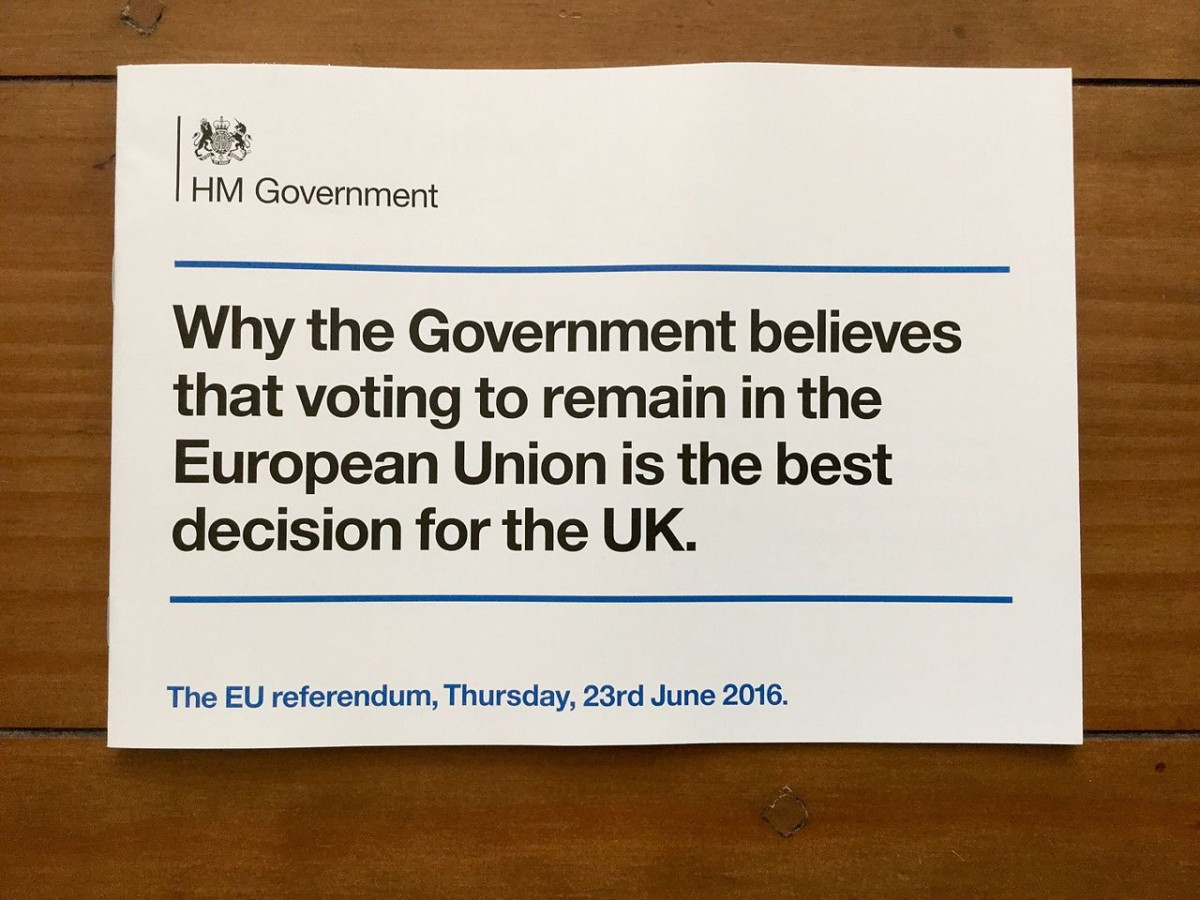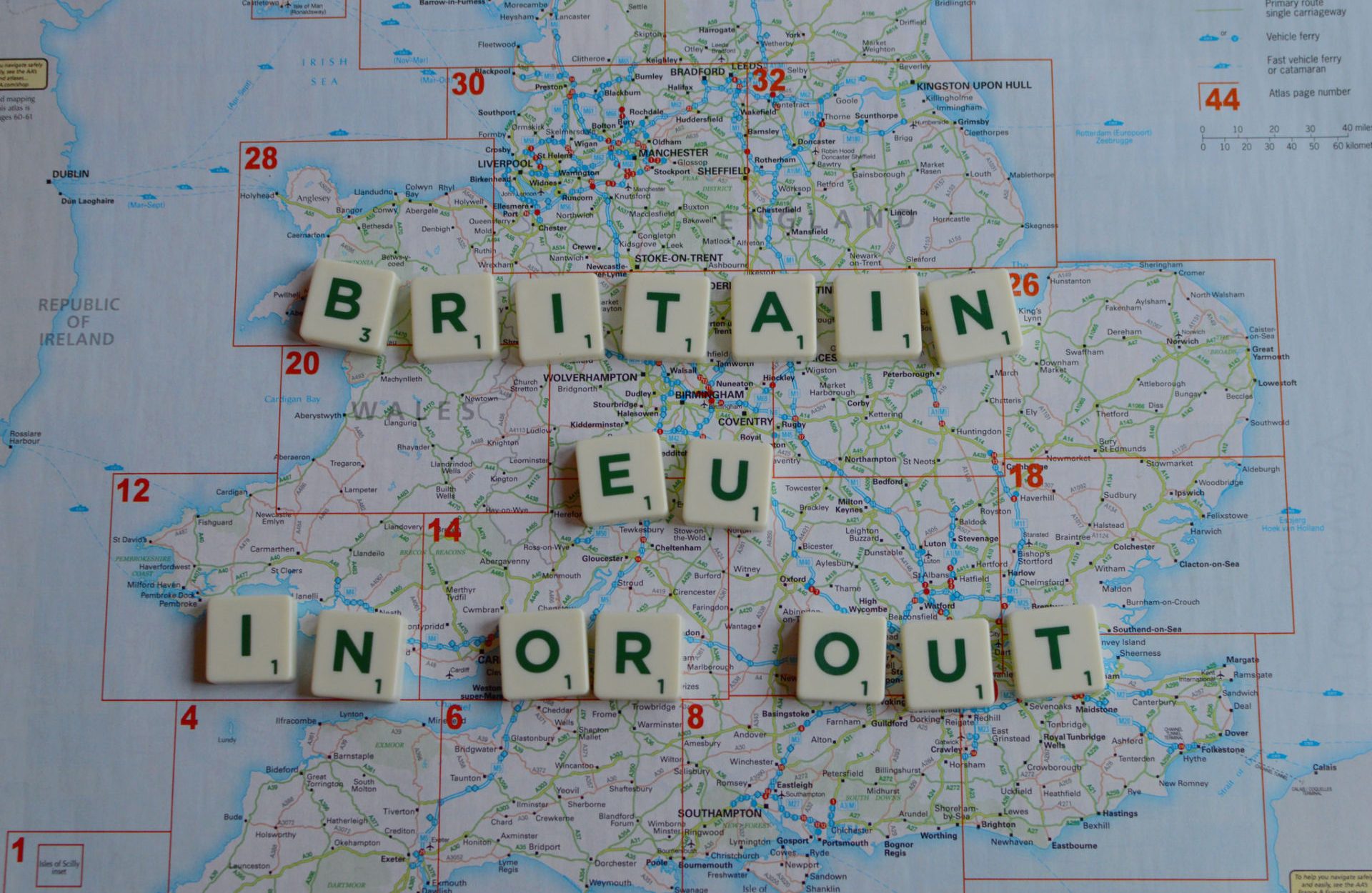Is a vote to leave the EU based upon an emotional call for a new dawn for British politics, a way of improving all that is perceived to be wrong as the result of foreign intrusion into the national? Is a vote to remain a decision based upon weighing up pros and cons of membership, analysing the facts presented and then making a calculated decision?
This would seem to be the way that the mainstream public debate over the UK’s continued membership of the EU has been framed, perhaps unconsciously, by the ‘Leave’ and ‘Remain’ camps at the centre of the referendum debate. Whereas one camp argues from the heart, the other instead speaks to the head; but which is more convincing? And shouldn’t there be some fusion of the two? As this piece argues, Leave and Remain are running two very different types of campaign.
Leave focuses on sweeping claims and pronouncements about reclaiming a sense of British independence, but is light on detail. Remain, in comparison, is running a campaign focused very much on the detail, but lacking in larger pronouncements about the UK’s role in the EU beyond its own narrowly-determined national interests. However, as the day of the referendum draws closer, in order to convince eligible voters of the merits of their claims, perhaps Leave needs to provide some more evidence in support of their claims; Remain, in comparison, may need to go beyond the technical cost-benefit analysis it currently bases its arguments on, presenting a more passionate case that compels voters to not only accept its arguments, but vote based upon them.
Leave needs to provide some more evidence in support of their claims; Remain needs to go beyond technical cost-benefit analysis
There can be no doubt that the Leave campaign has been an impassioned one, albeit divided and occasionally contradictory: prior to the Electoral Commission deciding a victor, three different groups aimed to be the official voice of the Leave campaign – Vote Leave (the official campaign), Grassroots Out (whose website is no longer available, and which seems to be dormant in terms of campaigning) and Leave.EU (closely associated with UKIP). But what has unified them is the belief that the UK will be better outside the EU, with claims of ‘making Britain Great again’, ‘regaining control’ and ‘winning back our country’.
The rhetoric is based in the emotive language of sovereignty with the data presented tending towards the grand claim rather than the in-depth study; Vote Leave regularly refers to the spending of £350 million per year ‘on Brussels’, which, if we leave, could be spent ‘on our priorities, like the NHS and science research’. Leave.EU also makes this sort of claim, referring to a £15 billion each year membership fee to the EU; exiting the ‘United States of Europe’, which they say crushes our democracy, and only creates self-serving politicians, would allow the people of the UK to imagine a different and richer life. ‘Freedom, security and wealth awaits us outside’, Leave.UK say, ‘Britain could do so much better outside of the EU’.
‘Freedom, security and wealth awaits us outside’, Leave.UK say
The Leave camp have been accused of providing a lot of heat, but little light. Where facts are used by the campaign, they are frequently subject to rounding criticism. The £350 million per year figure was criticised by the head of the UK Statistics Authority as being potentially misleading – the £15 billion annual membership fee claim has also been scrutinised by fullfact.org. Fullfact.org describes itself as an independent, non-partisan, fact-checking charity, which concluded that the figure did not include the UK’s rebate or spending on the UK, and that the Office for National Statistics, the source of this figure, has informed them the use of that figure is incorrect.
Appearances of figures such as Boris Johnson at the Commons Treasury committee have also been subject to criticism, with the Financial Times significantly underwhelmed by Johnson’s performance . Responding to Johnson’s claim that a UK out of the EU would secure an agreement that provided for all the benefits of access to the single market with none of the drawbacks, MP Rachel Reeves said that he had no facts to back that up. ‘Yes’, was Boris Johnson’s somewhat vague reply. ‘Yes’ he had no facts to back it up, or ‘yes’ he did? His explanation, that it would be ‘foolish’ of the EU to impose barriers upon British trade, would appear to indicate the former – follow-up questions from the committee on the evidential basis for this claim did not find Johnson forthcoming. Dominic Cummings, Vote Leave’s campaign director, was considered by the committee chair MP Andrew Tyrie of ‘playing “fast and loose” with the facts.
The vision of what the UK would look like afterwards was also confusing; something akin to the agreement with Norway for example? Or perhaps Iceland? A series of bilateral agreements as in the case of Switzerland, maybe. Boris Johnson’s preferred option, based on the World Trade Organisation framework, could see the UK ‘be like Canada’ and quickly secure an EU-UK trade deal similar to the Canada-EU Trade Agreement. The World Trade model also appears to be the preferred model of Vote Leave. But if the Treasury committee appearances are anything to go by, the argument for Brexit is an impassioned ‘we don’t know what things will look like after we leave, but we know they’ll be better’.
Is the Remain campaign any more convincing? Rallying under the banner of ‘Britain Stronger In Europe’, Remain presents itself as the voice of reason, the reasoned product of the head, not the impassioned (but, it is inferred, misguided) heart. It makes its case based on facts, figures and statistics, relying upon opinions from weighty names and institutions to drive its message home. The official website of the campaign has a page exclusively dedicated to ‘what the experts say’, with more than 1,000 appearing in a formidable list shrunken to unreadable size as if to reinforce the sheer volume of wisdom behind their cause. It is followed by key quotes from figures such as Mark Carney, Governor of the Bank of England, and organisations such as the International Monetary Fund (IMF), all reiterating the importance of the EU for the UK, and of the UK for the EU.
The claim to expertise, when used successfully, is a powerful one. In 21st century politics, governments and international organisations (the EU included) rely on a wealth of ‘experts’ to help in formulating law and policies, on the basis that these knowledgeable individuals ensure that decisions are ‘evidence-based’.
And evidence is not something that the Remain camp is short of it appears; from a government-produced booklet of ‘facts’ about EU membership sent to homes throughout the UK (decried as unfair campaigning in favour of remaining by ‘Leave’ supporters in the House of Commons), to statements by the IMF, Organisation for Economic Cooperation and Development (OECD) and credit-rating agency Moody’s offering grim pronouncements on the negative impact of ‘Brexit’ on the UK’s GDP figures and international financial standing.

Photo by MOTORAL1987
In comparison to the more muted support given to the Leave campaign, ‘experts’ in finance and trade have lined up to reaffirm the importance of the UK’s place in the EU, based on presentations of ‘hard’ economic data. In what some perceive as a coup for Remain, and others as a gift to Leave, President Obama made a strong and undeniable statement in favour of the UK’s continued EU membership, rebuffing prominent Brexiters’ claims that the UK would be free to trade with the US on its own terms by bluntly stating that the UK would be ‘at the back of the queue’. While not necessarily an expert in the technical sense, voters would nevertheless see a powerful and recognisable figure making an unequivocal statement; and after all, who would possibly know better than the US President how the US may conduct trade with other nations? And for that figure, what would be deemed more important: trade with an entire regional bloc, or one single state?
Remain’s campaign relies on this economic data. It is coldly rational, a cost-benefit analysis. Stronger In’s website, for example, summarises its support for remaining in the EU on three principles: – a stronger economy, stronger leadership and stronger security. We should stay in the EU because it creates jobs and financial benefits, because it allows us to have a stronger voice to protect Britain’s interests on the world stage, and because it helps to keep Britain safe. And if we leave, it argues, there will be catastrophe. As if to reaffirm the fear, the current uncertainty over whether the UK will stay or go is already appearing to have a deleterious impact upon the UK’s economy, ranging from a decrease in the value of the pound to a seven year low, banks developing contingency plans over concerns over frozen capital markets, to investments in the UK and UK-based companies being placed on hold until after the result is decided.
Remain’s campaign relies on coldly rational analysis.
The economic arguments may be strong, but what happens if we vote to stay? Where are Remain’s visions for the European continent? Idealism, a creature of the heart rather than the head, does not feature in the mainstream Remain campaign. Maybe this isn’t so surprising. David Cameron, who is the Remain campaign’s most prominent and visible advocate, has forged his political career in criticisms of the EU and the UK’s place in it. From taking the Conservatives out of the mainstream centre-right European Parliamentary group the European People’s Party in 2009, to declaring leaving the EU as ‘imaginable’ in 2012, the Prime Minister has never been a devout Europhile. Similarly, Theresa May has been so equivocal on the EU (particularly concerning its Justice and Home Affairs dimension, in her position as Home Secretary) that in 2015, newspapers were considering her as a potential leading figure of the Brexit campaign.
Jeremy Corbyn, leader of the Labour Party and of the Opposition, has form too as a Eurosceptic in the Bennite tradition, considering the EU to be much more beneficial to multinational corporations than individual citizens. Yet all are now in favour of retaining EU membership, albeit in a reluctant, almost grudging manner. In a campaign where the leading figures have traditionally held Eurosceptic positions (albeit on polar extremes – Cameron and May wanting more free market, less social chapter, and Corbyn the opposite), it is not surprising that it is based in arguments concerning how it benefits the UK’s specific and current interests now, rather than more emotive arguments of what Europe could be.
And the British voters? How are they to interpret all this? Are they likely to vote with heart, or head? Are they committed to a European ideal, or to reclaiming sovereignty allegedly long denied? Or are they predisposed to the weighty economic arguments?
According to one study, the battle lines over EU membership are just as likely to be drawn by level of education as much as age, the typical indicator of voter affiliation. Those educated to the level of graduate degree or higher are more likely to be in favour of continued EU membership (albeit with young graduates being more likely than older graduates to be so), whereas amongst those with low levels of education (those with no qualifications) or GCSE education only being more inclined to vote to leave (again, with older voters being considerably more likely to favour leaving). Could this suggest that individuals with lower levels of attainment are likely to base their decision more on heart, and the emotional argument, than the more educated, who may place a greater weight upon ‘rational’ argument and factual cases? Or is it the ‘haves’, as described by Iain Duncan Smith, voting for the benefits they receive from the EU against the ‘have-nots’ whom the EU ignores?
Those with graduate degrees or higher are more likely to be in favour of EU membership
With current polls indicating huge uncertainty for the referendum’s outcome, perhaps it’s time for both camps to engage more effectively both the head and the heart. Perhaps we need more data from the Leave group and more vision from the Remain? Ultimately, the approaches of both campaigns may present considerable difficulties to voters, particularly those currently undecided. For those leaning toward Leave, the impassioned arguments may inspire the desire to vote, but a lack of certainty or information about the effects may stay their hand. For those leaning towards Remain, they may be convinced of the arguments presented, but the lack of a stirring campaign may see them just stay home on June 23rd.
Banner photo by Jeff Djevdet (https://speedpropertybuyers.co.uk/) via Flickr.



